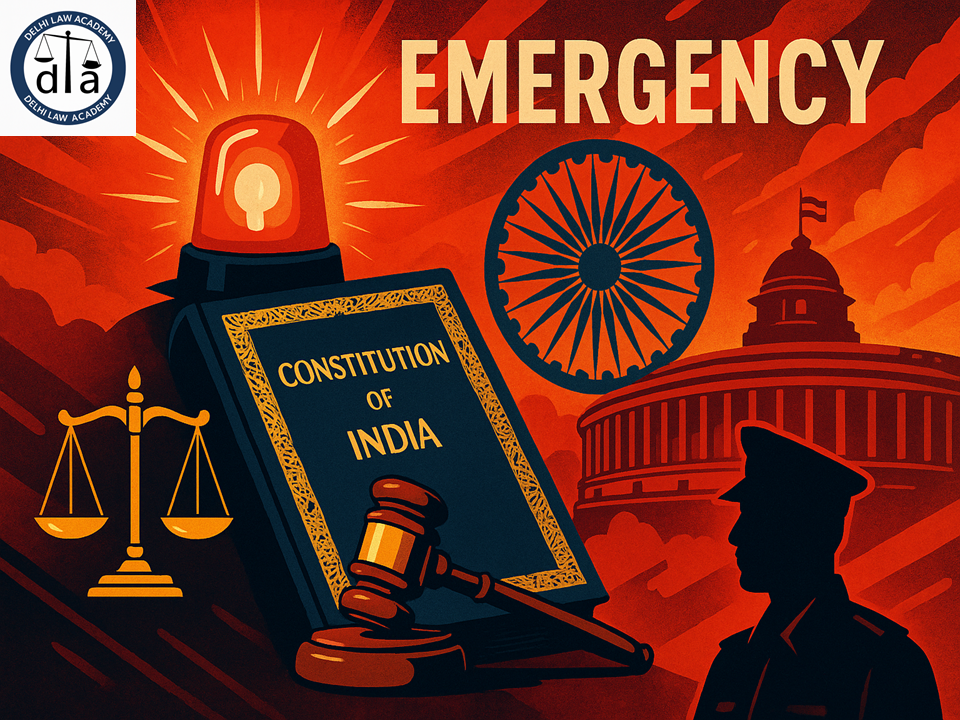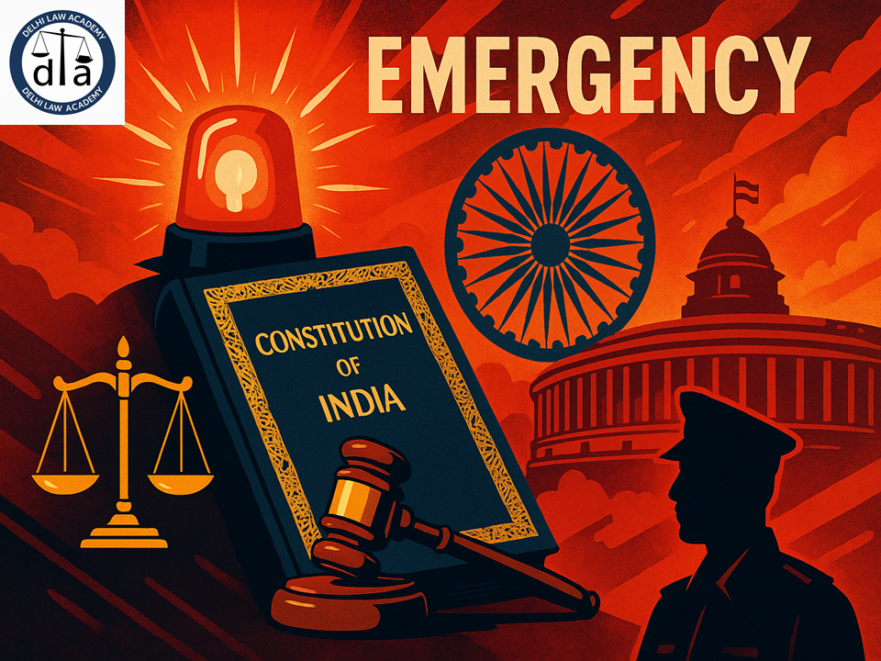
📌 Key Topics Covered in This Blog
Get a quick overview of what you will learn about Article 356 and related Emergency Provisions:
- 🛡️ Duty of the Union to protect every State
- ⚠️ Failure of Constitutional machinery in a State
- ⏱ Maximum Time Limit of validity of a proclamation under Article 356(1)
- 📋 Pre-conditions for extension beyond one year of a proclamation under Article 356(1)
- ❓ Whether a proclamation under Article 356(1) is amenable to judicial review?
- ⚖️ Limitations on the power of review
- 📜 Effect of the bar imposed by Article 74(2) on judicial review of a proclamation under Article 356(1)
- 🔹 Powers that the President may exercise under Article 356(1)
- ⛔ Limitation on the powers of the President exercisable under Article 356(1)
Scroll down to read the detailed explanation of each topic. 👇
📕 Articles 355 & 356 – Emergency Provisions in India
🛡️ Article 355 – Protection of States
- It shall be the duty of Union
- to protect every State
- against external aggression and internal disturbance
- to ensure that govt of every State is carried on
- in accordance with provisions of this Constitution
- to protect every State
⚠️ Article 356 – Failure of Constitutional Machinery in a State
- If President is satisfied, on a report from Governor or otherwise
- that govt of a State cannot be carried on
- in accordance with provisions of this Constitution
- President may by Proclamation
- assume to himself
- functions of State Govt
- powers vested in Governor
- powers vested in any authority other than State Legislature and High Court
- declare that powers of State Legislature
- shall be exercised by Parliament or under authority of Parliament
- suspend any provision of this Constitution
- relating to any authority other than High Court
- assume to himself
✅ Approval by Parliament
- Proclamation shall cease to operate
- at the end of 2 months unless Parliament approves it before that
- If House of People is not in existence
- Proclamation needs to be approved only by Council of States
- As and when House of People is reconstituted
- Proclamation needs to be approved by it within 30 days for further continuance
- A Proclamation approved by Parliament
- shall continue to operate till 6 months from the date of its issue
- Subsequent approvals
- are valid for further 6 months
⏱ Maximum Time Limit
- No Proclamation shall in any case remain in force for more than 3 years
📋 Pre-conditions for Extension Beyond One Year
- Proclamation can extend beyond one year only if
- Proclamation of Emergency is in force
- in whole of India or any part of that State at the time of approval by Parliament
- Election Commission certifies that
- continuance of Proclamation is necessary
- due to difficulties in holding general elections to Legislative Assembly
- Proclamation of Emergency is in force
❓ Question & Answer
- Question: Whether a proclamation under article 356(1) is amenable to judicial review?
- Answer: Validity of a Proclamation issued u/A 356(1) is judicially reviewable
🔎 Extent of Examination
- whether it was issued on the basis of any material at all or
- whether the material was relevant or
- whether the Proclamation was issued in the mala fide exercise of power
⚖️ Limitations on the Power of Review
- The court will not go into the correctness of the material or its adequacy
- Its enquiry is limited to see whether the material was relevant to the action
- Even if part of the material is irrelevant, the court cannot interfere so long as there is some material which is relevant to the action taken
📌 Burden of Proof
- When a prima facie case is made out in a challenge to the Proclamation
- the burden is on the Union Govt to prove that relevant material did in fact exist
📜 Reason: Section 106 Evidence Act
- Since such material would be exclusively within the knowledge of Union Govt, burden of proving its existence would be on the Union Govt
- Section 106: Fact specially within knowledge – When any fact is specially within the knowledge of any person, burden of proving that fact is upon him
⚖️ Effect of the Bar Imposed by Article 74(2)
- Article 74(2) bars judicial review so far as the advice given by the Ministers is concerned, it does not bar scrutiny of the material on the basis of which the advice is given
- The material on the basis of which advice was tendered does not become part of the advice
🔹 Which Powers to Exercise?
- When the President issues Proclamation u/A 356(1), he may exercise all or any of the powers under sub-clauses (a), (b) and (c)
- It is for him to decide which of the said powers he will exercise, and at what stage
⛔ Limitation on These Powers
- Clause (3) of Article 356 is intended to be a check on the powers of the President under clause (1)
📖 Continue the Series
Don’t stop here! Learn more about Emergency Provisions in India in our next parts:
📚 Further Reading for Law Aspirants
Explore more useful resources from Delhi Law Academy to strengthen your preparation:
❓ FAQs on Article 356 & Emergency Provisions
🛡️ What is the duty of the Union under Article 355? ➕
The Union has a duty to protect every State against external aggression and internal disturbance, and to ensure that the government of every State is carried on in accordance with the Constitution.
⚠️ What happens when there is a failure of constitutional machinery in a State? ➕
If the President is satisfied that a State government cannot function according to the Constitution, he may assume the functions of the State Government, declare that powers of the State Legislature shall be exercised by Parliament, and suspend provisions relating to any authority other than the High Court.
⏱ What is the maximum validity of a proclamation under Article 356(1)? ➕
No Proclamation shall remain in force for more than 3 years. Initial approval by Parliament allows operation for 6 months, and subsequent approvals can extend it further for 6 months at a time.
📋 Under what conditions can a proclamation extend beyond one year? ➕
Extension beyond one year is allowed only if an Emergency is in force in the whole of India or part of the State, and the Election Commission certifies that continuation is necessary due to difficulties in holding general elections.
❓ Is a proclamation under Article 356(1) subject to judicial review? ➕
Yes, the validity of a Proclamation is judicially reviewable. Courts examine whether it was issued on the basis of any material, whether the material was relevant, and whether it was mala fide. However, the court does not question the adequacy or correctness of the material.
⚖️ What are the limitations on the powers exercised by the President under Article 356? ➕
Clause (3) of Article 356 acts as a check on the President’s powers under clause (1). He may exercise all or any powers under sub-clauses (a), (b), and (c), but the exercise is subject to parliamentary approval and judicial review as applicable.
Contact us
📍 Delhi Law Academy – Jaipur Branch
6C, Tower 2, Coaching Hub, Pratap Nagar, Jaipur – 302033
📞 Phone:
+91 9911916552
+91 8447285606
✉️ Email:
contactus@delhilawacademy.com

